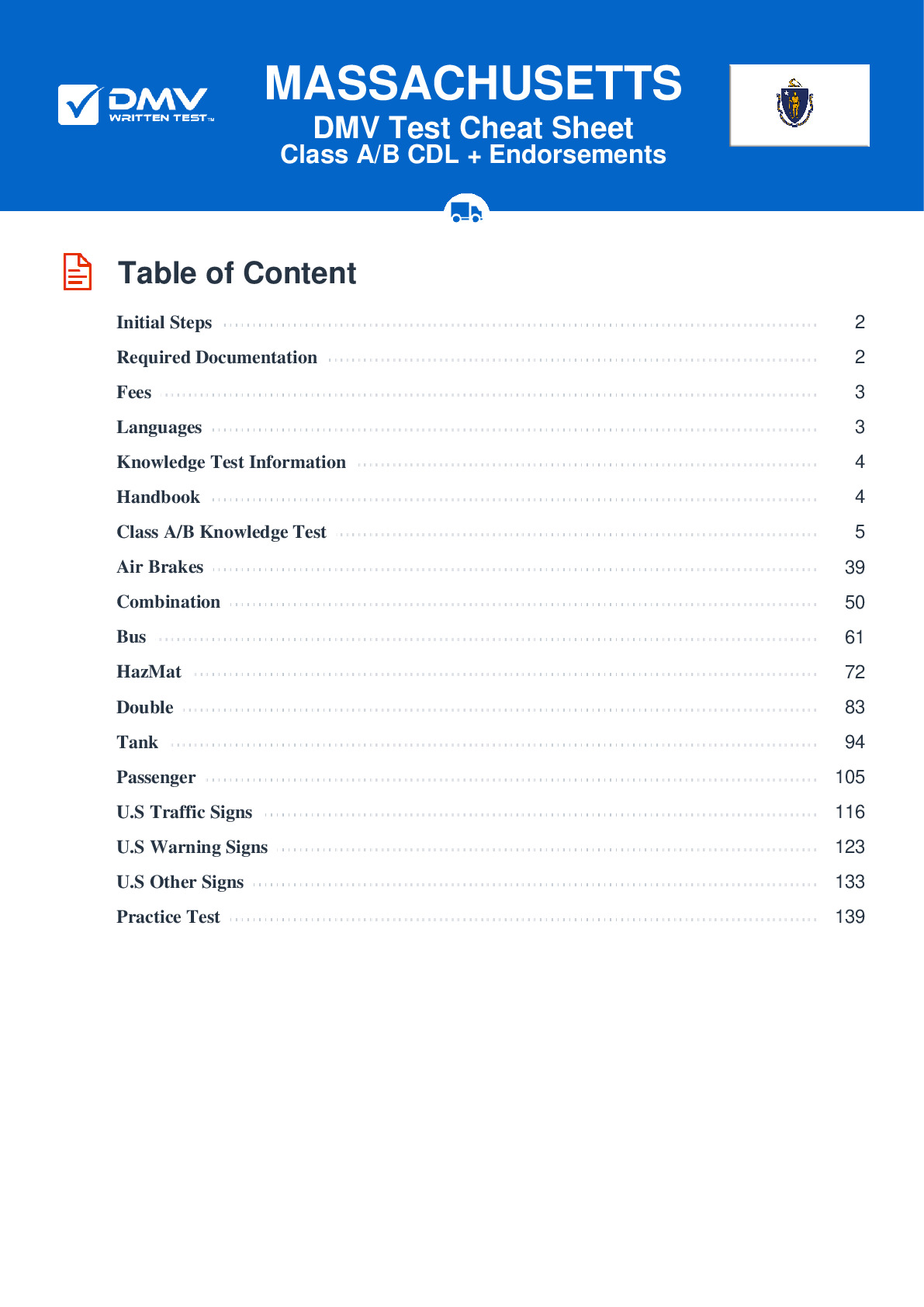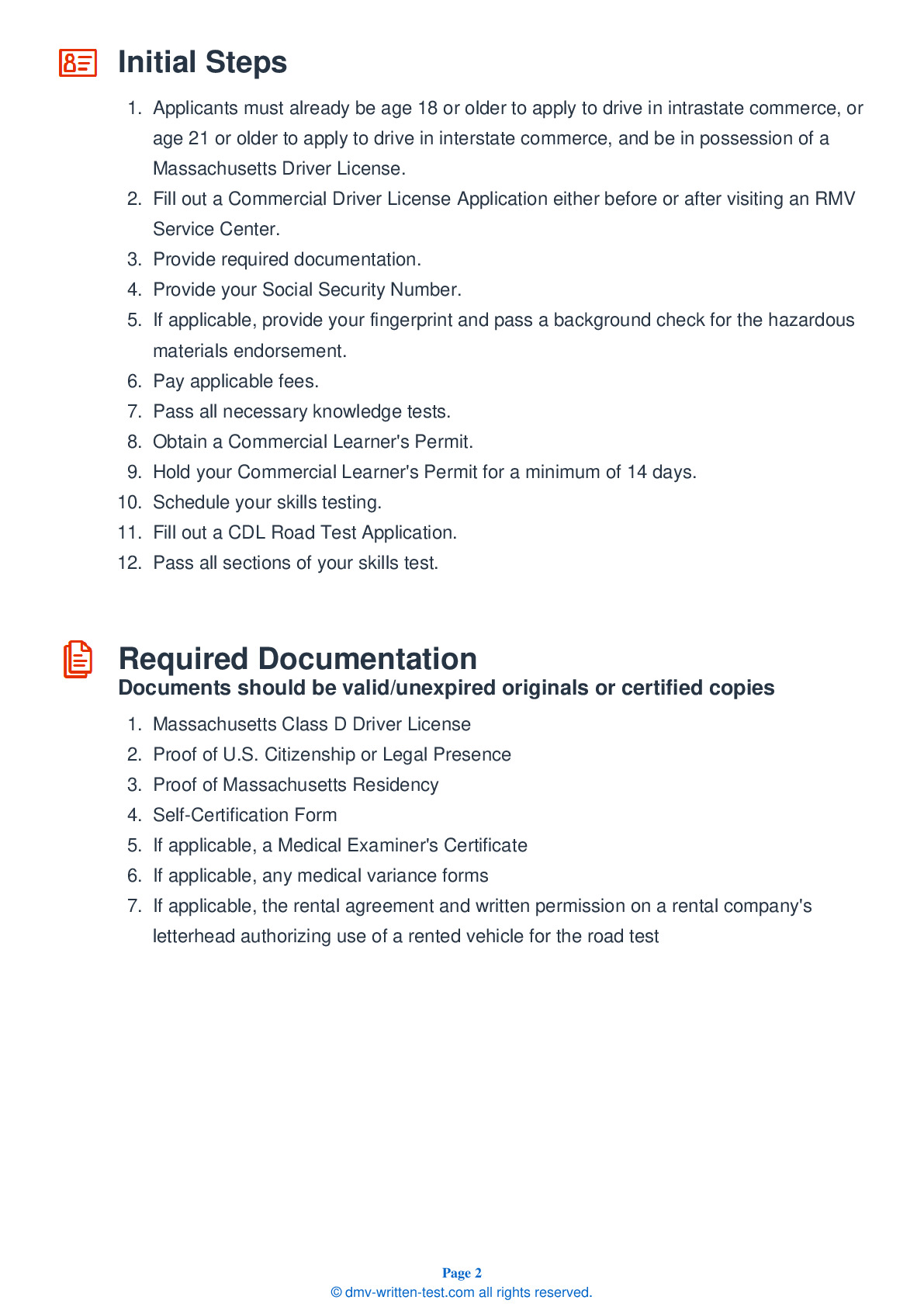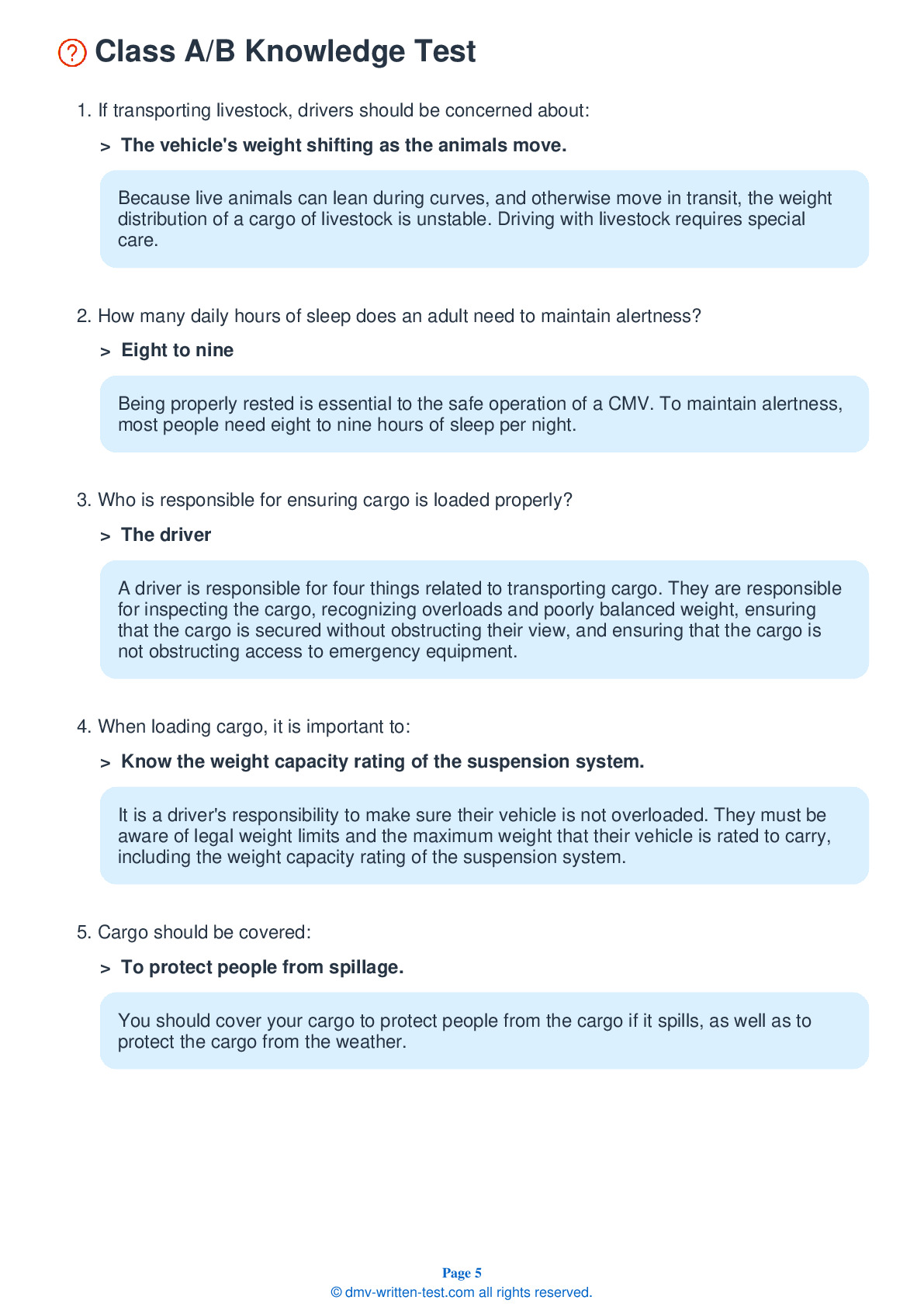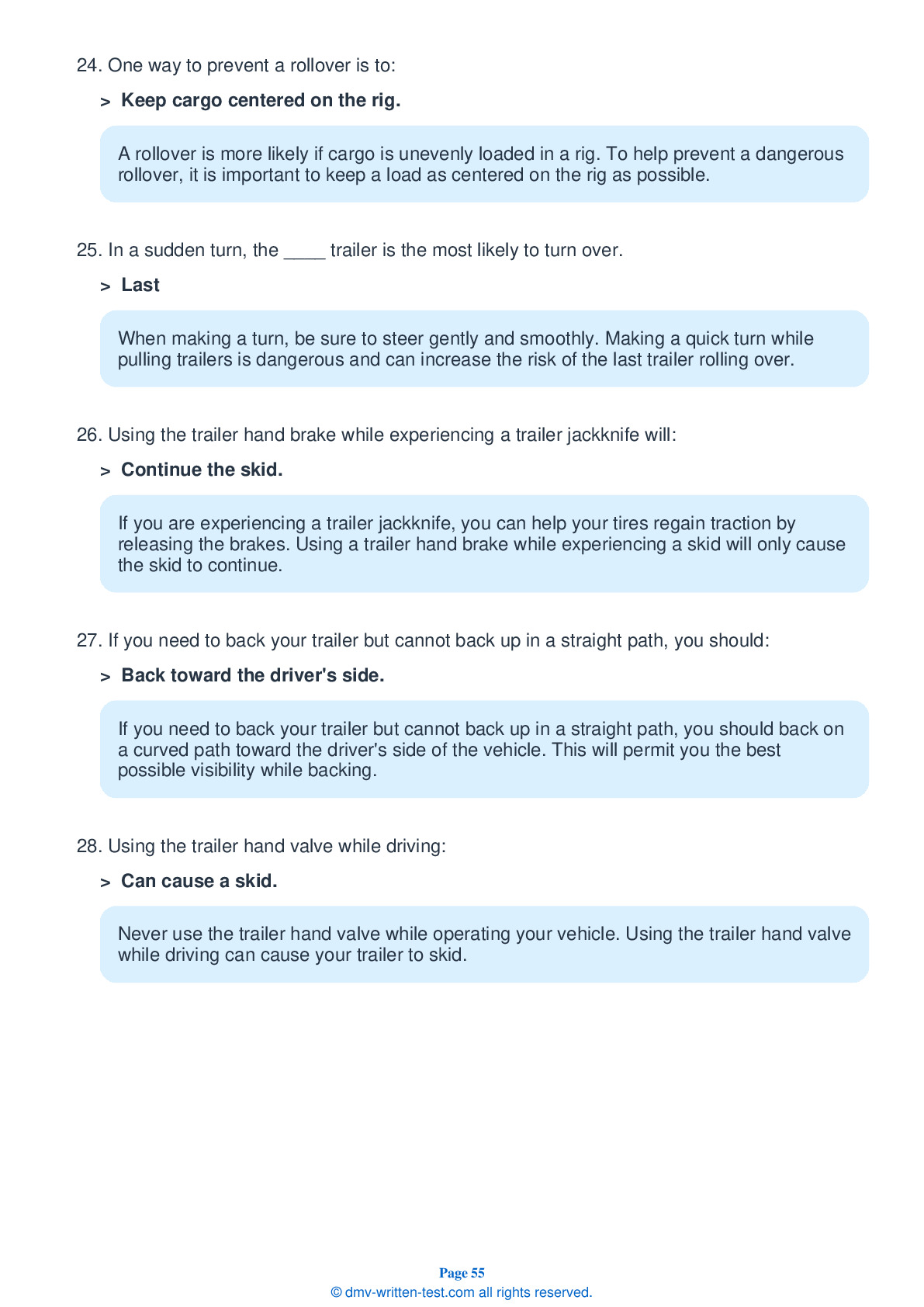Double
This endorsement is required if the driver will pull two or three trailers. To receive this endorsement, applicants must pass a test. The test consists of 20 multiple choice questions. To pass, the applicant must answer at least 16 questions correctly. Each question has four possible answer choices. Test questions come from the Commercial Driver License Manual. Questions come from chapters covering: Driving Safely, Air Brakes (if applicable), Combination Vehicles and Doubles and Triples. The Double/Triple endorsement can be used with the Class A CDL.
Number of Question
Passing Score
8. If another driver is tailgating you, you should:
Explanation
If you are being tailgated, it is advisable to open up the space in front of your vehicle, making it easier for the tailgater to get around you. Speeding up may be counterproductive because the driver may continue to tailgate you at the higher speed, only increasing the danger.
9. During a static leakage test, the maximum leakage rate for a triple combination vehicle with air brakes is ____ in a minute.
Explanation
When performing a static leakage test on a triple combination vehicle with air brakes, the leakage rate should be no more than 5 psi in one minute. If air leaks from the air brake system at a quicker rate, the vehicle should not be driven because something likely needs to be repaired.
10. Drivers may use ____ red reflective warning triangles when their vehicle is stopped on the side of the road.
Explanation
If a vehicle carries red reflective triangles, the driver should place three of them as warning devices when the vehicle is parked on the road.
11. According to a National Sleep Foundation poll, about ____ of people have driven while sleepy.
Explanation
According to the National Sleep Foundation’s Sleep in America poll, 60 percent of Americans have driven while feeling sleepy, and 36 percent admit to having actually fallen asleep while driving.
12. A vehicle must be equipped with all of the following, except:
Explanation
All commercial motor vehicles are required to be equipped with the proper emergency equipment. This may include spare electrical fuses; three red reflective triangles, six fuses, or three liquid burning flares; and at least one properly charged and rated fire extinguisher.
13. When using a fire extinguisher on a fire, you should:
Explanation
When using a fire extinguisher, you should stay as far away from the flames as possible and aim at the base of the fire.
14. Hydroplaning usually occurs:
Explanation
In places where water collects on the road, it is possible for a vehicle to hydroplane. Low tire pressure or worn tire tread makes this more likely to happen. If there is enough water on a road surface, hydroplaning can occur at speeds as low as 30 mph.
Frequently Asked Questions
To obtain a CDL Doubles/Triples endorsement in Massachusetts, you need to follow these steps:
1. Obtain a valid Massachusetts CDL: You must have a valid CDL in Massachusetts before you can apply for any endorsement.
2. Study for the Doubles/Triples endorsement: You should study the Massachusetts CDL Driver’s Manual, paying close attention to the Doubles/Triples section. You may also consider taking a CDL practice test.
3. Schedule an appointment: Schedule an appointment at your local RMV (Registry of Motor Vehicles) branch office. Be sure to specify that you are applying for the Doubles/Triples endorsement.
4. Bring required documents: Bring your current Massachusetts CDL and a valid medical certificate to the RMV office.
5. Pass a knowledge test: You will need to pass a knowledge test on doubles/triples, which includes questions about coupling and uncoupling, inspecting doubles/triples, and driving doubles/triples.
6. Pay the fee: Pay the required fee for the Doubles/Triples endorsement.
7. Receive your new CDL: Once you have passed the knowledge test and paid the fee, you will receive your new CDL with the Doubles/Triples endorsement.
Note: You may also need to undergo additional training and testing if you plan to operate certain types of commercial vehicles with doubles/triples in Massachusetts.
1. Obtain a valid Massachusetts CDL: You must have a valid CDL in Massachusetts before you can apply for any endorsement.
2. Study for the Doubles/Triples endorsement: You should study the Massachusetts CDL Driver’s Manual, paying close attention to the Doubles/Triples section. You may also consider taking a CDL practice test.
3. Schedule an appointment: Schedule an appointment at your local RMV (Registry of Motor Vehicles) branch office. Be sure to specify that you are applying for the Doubles/Triples endorsement.
4. Bring required documents: Bring your current Massachusetts CDL and a valid medical certificate to the RMV office.
5. Pass a knowledge test: You will need to pass a knowledge test on doubles/triples, which includes questions about coupling and uncoupling, inspecting doubles/triples, and driving doubles/triples.
6. Pay the fee: Pay the required fee for the Doubles/Triples endorsement.
7. Receive your new CDL: Once you have passed the knowledge test and paid the fee, you will receive your new CDL with the Doubles/Triples endorsement.
Note: You may also need to undergo additional training and testing if you plan to operate certain types of commercial vehicles with doubles/triples in Massachusetts.
To get a CDL Doubles/Triples license in Massachusetts, you must meet the following requirements:
1. Age: You must be at least 21 years old to drive a commercial vehicle with a Doubles/Triples endorsement.
2. Valid CDL: You must have a valid Massachusetts commercial driver's license (CDL).
3. Driving record: You must have a clean driving record and not have any disqualifying offenses on your record.
4. Medical certificate: You must have a valid medical certificate to operate a commercial vehicle with Doubles/Triples endorsement.
5. Pass the Doubles/Triples knowledge test: You must pass the knowledge test for Doubles/Triples endorsement at the RMV office.
6. Additional requirements: Depending on the type of commercial vehicle you plan to operate with Doubles/Triples endorsement, you may need additional training and testing.
7. Pay the required fee: You must pay the required fee for the Doubles/Triples endorsement, which may include an application fee and testing fee.
It's important to note that obtaining a CDL Doubles/Triples license is a serious responsibility that requires additional skills and knowledge. Therefore, it is important to carefully study and prepare for the knowledge test and any required training and testing before applying for this endorsement.
1. Age: You must be at least 21 years old to drive a commercial vehicle with a Doubles/Triples endorsement.
2. Valid CDL: You must have a valid Massachusetts commercial driver's license (CDL).
3. Driving record: You must have a clean driving record and not have any disqualifying offenses on your record.
4. Medical certificate: You must have a valid medical certificate to operate a commercial vehicle with Doubles/Triples endorsement.
5. Pass the Doubles/Triples knowledge test: You must pass the knowledge test for Doubles/Triples endorsement at the RMV office.
6. Additional requirements: Depending on the type of commercial vehicle you plan to operate with Doubles/Triples endorsement, you may need additional training and testing.
7. Pay the required fee: You must pay the required fee for the Doubles/Triples endorsement, which may include an application fee and testing fee.
It's important to note that obtaining a CDL Doubles/Triples license is a serious responsibility that requires additional skills and knowledge. Therefore, it is important to carefully study and prepare for the knowledge test and any required training and testing before applying for this endorsement.
Yes, you may need specific experience or training to obtain a CDL Doubles/Triples endorsement in Massachusetts, depending on the type of commercial vehicle you plan to operate with this endorsement.
For example, if you plan to operate a tractor-trailer with two or more trailers, you will need to complete a specialized training course that is designed for driving Doubles/Triples vehicles. This training course will cover topics such as coupling and uncoupling procedures, inspecting Doubles/Triples vehicles, and safe driving techniques.
Additionally, you may need to pass a skills test that specifically evaluates your ability to operate a Doubles/Triples vehicle. This skills test will include tasks such as backing up your vehicle, turning corners, and maneuvering in tight spaces.
It's important to note that the specific requirements for obtaining a CDL Doubles/Triples endorsement can vary depending on the state and the type of commercial vehicle you plan to operate. Therefore, it's important to consult the Massachusetts CDL Driver's Manual or contact your local RMV office for more information about the requirements and training programs available in your area.
For example, if you plan to operate a tractor-trailer with two or more trailers, you will need to complete a specialized training course that is designed for driving Doubles/Triples vehicles. This training course will cover topics such as coupling and uncoupling procedures, inspecting Doubles/Triples vehicles, and safe driving techniques.
Additionally, you may need to pass a skills test that specifically evaluates your ability to operate a Doubles/Triples vehicle. This skills test will include tasks such as backing up your vehicle, turning corners, and maneuvering in tight spaces.
It's important to note that the specific requirements for obtaining a CDL Doubles/Triples endorsement can vary depending on the state and the type of commercial vehicle you plan to operate. Therefore, it's important to consult the Massachusetts CDL Driver's Manual or contact your local RMV office for more information about the requirements and training programs available in your area.
Yes, to obtain a CDL Doubles/Triples endorsement in Massachusetts, you are required to pass a written test specifically for Doubles/Triples vehicles. The Doubles/Triples endorsement written test is designed to evaluate your knowledge of the rules and regulations for operating commercial vehicles with two or more trailers.
The Doubles/Triples endorsement test covers topics such as:
1. Coupling and uncoupling procedures
2. Inspection and maintenance of Doubles/Triples vehicles
3. Safe driving practices for Doubles/Triples vehicles
4. Special rules and restrictions for Doubles/Triples vehicles
To prepare for the test, you should study the Massachusetts CDL Driver's Manual, which includes information about the Doubles/Triples endorsement requirements and regulations. You may also find online practice tests and study guides that can help you prepare for the exam.
It's important to note that passing the written test is only one part of obtaining a CDL Doubles/Triples endorsement in Massachusetts. Depending on the type of commercial vehicle you plan to operate with this endorsement, you may also need to complete specialized training and pass a skills test to demonstrate your ability to operate a Doubles/Triples vehicle safely.
The Doubles/Triples endorsement test covers topics such as:
1. Coupling and uncoupling procedures
2. Inspection and maintenance of Doubles/Triples vehicles
3. Safe driving practices for Doubles/Triples vehicles
4. Special rules and restrictions for Doubles/Triples vehicles
To prepare for the test, you should study the Massachusetts CDL Driver's Manual, which includes information about the Doubles/Triples endorsement requirements and regulations. You may also find online practice tests and study guides that can help you prepare for the exam.
It's important to note that passing the written test is only one part of obtaining a CDL Doubles/Triples endorsement in Massachusetts. Depending on the type of commercial vehicle you plan to operate with this endorsement, you may also need to complete specialized training and pass a skills test to demonstrate your ability to operate a Doubles/Triples vehicle safely.
To obtain a CDL Doubles/Triples endorsement in Massachusetts, you will need to pass a skills test that evaluates your ability to operate a commercial vehicle with two or more trailers. The skills test is conducted on a closed course and typically includes the following maneuvers:
1. Vehicle Inspection: You will be required to conduct a pre-trip inspection of your commercial vehicle, including the coupling and uncoupling of the trailers, to ensure that it is safe and roadworthy.
2. Basic Control Skills: You will be asked to demonstrate basic control skills such as backing up your vehicle, turning corners, and maneuvering in tight spaces.
3. On-Road Driving: You will be required to demonstrate your ability to safely operate a commercial vehicle with two or more trailers on the road. This includes proper acceleration and deceleration, lane changes, merging onto highways, and other driving maneuvers.
During the skills test, you will be evaluated on your ability to safely and effectively operate the commercial vehicle with two or more trailers in various situations. It is important to practice these maneuvers beforehand to ensure that you are prepared for the test.
It's important to note that the specific requirements for the CDL Doubles/Triples endorsement skills test can vary depending on the state and the type of commercial vehicle you plan to operate. Therefore, it's important to consult the Massachusetts CDL Driver's Manual or contact your local RMV office for more information about the requirements and testing procedures in your area.
1. Vehicle Inspection: You will be required to conduct a pre-trip inspection of your commercial vehicle, including the coupling and uncoupling of the trailers, to ensure that it is safe and roadworthy.
2. Basic Control Skills: You will be asked to demonstrate basic control skills such as backing up your vehicle, turning corners, and maneuvering in tight spaces.
3. On-Road Driving: You will be required to demonstrate your ability to safely operate a commercial vehicle with two or more trailers on the road. This includes proper acceleration and deceleration, lane changes, merging onto highways, and other driving maneuvers.
During the skills test, you will be evaluated on your ability to safely and effectively operate the commercial vehicle with two or more trailers in various situations. It is important to practice these maneuvers beforehand to ensure that you are prepared for the test.
It's important to note that the specific requirements for the CDL Doubles/Triples endorsement skills test can vary depending on the state and the type of commercial vehicle you plan to operate. Therefore, it's important to consult the Massachusetts CDL Driver's Manual or contact your local RMV office for more information about the requirements and testing procedures in your area.
No, you cannot operate a commercial vehicle with two or more trailers without a CDL Doubles/Triples endorsement in Massachusetts. The Doubles/Triples endorsement is a requirement for anyone who wants to operate a commercial vehicle with more than one trailer, regardless of the weight of the vehicle.
Driving a commercial vehicle with two or more trailers requires specialized training and additional knowledge of the rules and regulations that govern these vehicles. The Doubles/Triples endorsement is designed to ensure that commercial drivers have the necessary skills and knowledge to operate these vehicles safely on the road.
Operating a commercial vehicle without the proper CDL endorsements can result in serious consequences, including fines, license suspension or revocation, and even criminal charges in some cases. Therefore, it's important to ensure that you have the proper endorsements before operating a commercial vehicle with two or more trailers.
Driving a commercial vehicle with two or more trailers requires specialized training and additional knowledge of the rules and regulations that govern these vehicles. The Doubles/Triples endorsement is designed to ensure that commercial drivers have the necessary skills and knowledge to operate these vehicles safely on the road.
Operating a commercial vehicle without the proper CDL endorsements can result in serious consequences, including fines, license suspension or revocation, and even criminal charges in some cases. Therefore, it's important to ensure that you have the proper endorsements before operating a commercial vehicle with two or more trailers.
You can add the CDL Doubles/Triples endorsement to your existing CDL license in Massachusetts by passing the required knowledge and skills tests. To do so, you will need to:
1. Study the Doubles/Triples endorsement section of the Massachusetts CDL Driver's Manual to learn the rules and regulations that apply to operating commercial vehicles with two or more trailers.
2. Schedule an appointment with your local RMV office to take the Doubles/Triples endorsement knowledge test. You must pass this test before you can take the skills test.
3. After you pass the knowledge test, schedule an appointment to take the Doubles/Triples endorsement skills test. This will include a pre-trip inspection of your commercial vehicle, as well as basic control skills and on-road driving tests.
4. Once you pass both tests, your existing CDL license will be updated to include the Doubles/Triples endorsement.
It's important to note that adding a CDL endorsement may require additional fees and paperwork, so be sure to check with your local RMV office for specific requirements.
1. Study the Doubles/Triples endorsement section of the Massachusetts CDL Driver's Manual to learn the rules and regulations that apply to operating commercial vehicles with two or more trailers.
2. Schedule an appointment with your local RMV office to take the Doubles/Triples endorsement knowledge test. You must pass this test before you can take the skills test.
3. After you pass the knowledge test, schedule an appointment to take the Doubles/Triples endorsement skills test. This will include a pre-trip inspection of your commercial vehicle, as well as basic control skills and on-road driving tests.
4. Once you pass both tests, your existing CDL license will be updated to include the Doubles/Triples endorsement.
It's important to note that adding a CDL endorsement may require additional fees and paperwork, so be sure to check with your local RMV office for specific requirements.
Yes, there are restrictions and limitations for drivers with a CDL Doubles/Triples endorsement in Massachusetts. These restrictions and limitations are designed to ensure the safety of the driver, other motorists, and pedestrians on the road.
Some of the restrictions for drivers with a CDL Doubles/Triples endorsement include:
1. Weight Limitations: Drivers with a Doubles/Triples endorsement are limited to operating vehicles with a maximum weight of 80,000 pounds.
2. Length Limitations: Drivers with a Doubles/Triples endorsement are limited to operating vehicles with a maximum length of 28 feet for each trailer.
3. Route Restrictions: Some roads and highways may have restrictions on the use of double or triple trailers, so it's important to check local regulations before planning your route.
4. Specialized Training: Drivers with a Doubles/Triples endorsement are required to complete specialized training before operating these vehicles.
It's important to note that violating any of these restrictions can result in serious consequences, including fines, license suspension or revocation, and even criminal charges in some cases. Therefore, it's important to understand and follow all of the rules and regulations that apply to operating commercial vehicles with two or more trailers.
Some of the restrictions for drivers with a CDL Doubles/Triples endorsement include:
1. Weight Limitations: Drivers with a Doubles/Triples endorsement are limited to operating vehicles with a maximum weight of 80,000 pounds.
2. Length Limitations: Drivers with a Doubles/Triples endorsement are limited to operating vehicles with a maximum length of 28 feet for each trailer.
3. Route Restrictions: Some roads and highways may have restrictions on the use of double or triple trailers, so it's important to check local regulations before planning your route.
4. Specialized Training: Drivers with a Doubles/Triples endorsement are required to complete specialized training before operating these vehicles.
It's important to note that violating any of these restrictions can result in serious consequences, including fines, license suspension or revocation, and even criminal charges in some cases. Therefore, it's important to understand and follow all of the rules and regulations that apply to operating commercial vehicles with two or more trailers.
The maximum weight and length limits for double/triple trailers with a CDL Doubles/Triples endorsement in Massachusetts are regulated by federal and state laws.
The maximum weight limit for double/triple trailers is 80,000 pounds. This includes the weight of the tractor, the trailers, and any cargo being transported.
The maximum length limit for double/triple trailers is 28 feet for each trailer. This means that the overall length of the vehicle cannot exceed 84 feet, even with a tractor.
It's important to note that these weight and length limits may vary depending on the type of vehicle being used, as well as local regulations. Drivers with a Doubles/Triples endorsement should always check local laws and regulations before planning their routes to ensure they are in compliance with all applicable rules.
The maximum weight limit for double/triple trailers is 80,000 pounds. This includes the weight of the tractor, the trailers, and any cargo being transported.
The maximum length limit for double/triple trailers is 28 feet for each trailer. This means that the overall length of the vehicle cannot exceed 84 feet, even with a tractor.
It's important to note that these weight and length limits may vary depending on the type of vehicle being used, as well as local regulations. Drivers with a Doubles/Triples endorsement should always check local laws and regulations before planning their routes to ensure they are in compliance with all applicable rules.
Yes, there are several specific safety considerations and regulations for driving double/triple trailers with a CDL Doubles/Triples endorsement in Massachusetts. These regulations are in place to ensure the safety of the driver, other motorists, and pedestrians on the road.
Some of the specific safety considerations and regulations include:
1. Specialized Training: Drivers with a Doubles/Triples endorsement are required to complete specialized training that covers the safe operation of these vehicles, including coupling and uncoupling procedures, maneuvering, and driving techniques.
2. Weight Distribution: Proper weight distribution is crucial when operating double/triple trailers. Drivers should ensure that the weight is evenly distributed between all trailers to prevent swaying or instability on the road.
3. Braking System: Double/triple trailers require more braking power than single trailers. Drivers should be familiar with the braking system on their vehicle and ensure that it is in good working condition.
4. Speed Limits: Double/triple trailers have lower speed limits than single trailers on most roads and highways. Drivers should be aware of these speed limits and adjust their driving accordingly.
5. Maintenance Requirements: Double/triple trailers require regular maintenance to ensure that they are safe to operate. Drivers should perform pre-trip inspections before every trip to check for any issues or potential problems.
It's important for drivers with a Doubles/Triples endorsement to understand and follow all of these regulations to ensure their own safety and the safety of others on the road.
Some of the specific safety considerations and regulations include:
1. Specialized Training: Drivers with a Doubles/Triples endorsement are required to complete specialized training that covers the safe operation of these vehicles, including coupling and uncoupling procedures, maneuvering, and driving techniques.
2. Weight Distribution: Proper weight distribution is crucial when operating double/triple trailers. Drivers should ensure that the weight is evenly distributed between all trailers to prevent swaying or instability on the road.
3. Braking System: Double/triple trailers require more braking power than single trailers. Drivers should be familiar with the braking system on their vehicle and ensure that it is in good working condition.
4. Speed Limits: Double/triple trailers have lower speed limits than single trailers on most roads and highways. Drivers should be aware of these speed limits and adjust their driving accordingly.
5. Maintenance Requirements: Double/triple trailers require regular maintenance to ensure that they are safe to operate. Drivers should perform pre-trip inspections before every trip to check for any issues or potential problems.
It's important for drivers with a Doubles/Triples endorsement to understand and follow all of these regulations to ensure their own safety and the safety of others on the road.




